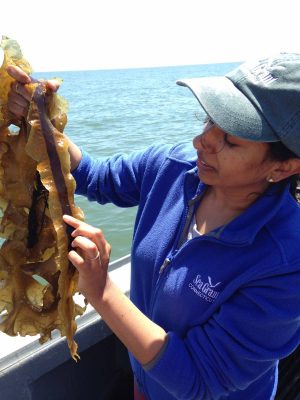
A new United Nations-affiliated international coalition to advance the world’s seaweed industry will include Connecticut Sea Grant Aquaculture Extension Specialist Anoushka Concepcion as one of the 15 members of its Steering Committee.
Concepcion, whose work has focused on fostering the growth of the commercial seaweed industry in Connecticut and beyond, will be one of two U.S. representatives on the Steering Committee for the Safe Seaweed Coalition.
The 10 nations represented on the coalition are working to support a “safe, sustainable and scalable seaweed industry to address some of the world’s most pressing challenges,” according to a statement from the coalition. Launching on March 17, it was created by the United Nations Global Compact and the London-based global charity Lloyd’s Register Foundation, in partnership with the Centre National de la Recherche Scientifique, a European public research organization.
“Through my participation in the coalition, I hope to be able to establish direct links with representatives from various stakeholder groups across the globe to provide answers, examples and solutions to many of the questions and needs we have in Connecticut and the United States,” Concepcion said.
In 2019, Concepcion led the establishment of the National Seaweed Hub with colleagues from nine other Sea Grant programs as a clearinghouse to troubleshoot ways to overcome obstacles the industry faces. A year ago, the group hosted the first-ever National Seaweed Symposium that brought together 100 farmers, researchers, regulators and others to brainstorm ways to move the industry forward.
In January, Connecticut Sea Grant expanded its involvement in furthering the growth of seaweed farming when it received a $766,650 federal grant to create the economic and business framework needed to spur the fledging industry into the mainstream. The project is being undertaken with partners at Sea Grant and university extension programs in nine East and West coast states.
Concepcion said her involvement in the Safe Seaweed Coalition will complement the ongoing projects.
“In Connecticut and the United States,” she said, “common challenges preventing the expansion of the emerging seaweed industry were identified by multiple stakeholder groups, through the National Seaweed Needs Assessment as well as during the National Seaweed Symposium. Through established stakeholder-driven work groups, we are working together to tackle these challenges. Stakeholders in other nations, specifically from Western countries, identified the same challenges and are in the process of addressing them, very much like we are doing domestically.
“By participating in the coalition, the United States will be connected to an international network,” she added. “We will have easier access to relevant information to better enable our decision-making.”
CT Sea Grant Director Sylvain De Guise said Concepcion’s participation will enhance her ability to positively influence this emerging industry.
“Anoushka’s appointment to the coalition reflects on her leadership in supporting the Long Island Sound seaweed aquaculture sector, and will expand her team-building efforts to the international scale,” he said.
The coalition was formed in response to the UN Global Compact’s mission to support sustainable development. Seaweed provides “a nutritious source of food to humans and animals and some compounds can be used as a substitute for plastics as well as for natural fertilizers or new medical treatments,” the coalition said in a statement. “Seaweed is also a key source of jobs and revenues to coastal communities, particularly for women. Seaweed can also act as a form of carbon sequestration and is increasingly being used as a ‘nature-based’ solution to mitigate climate change and restore abundance in the ocean ecosystem.”
Vincent Doumeizel, director of the food program at the Lloyd’s Register and senior advisor to the UN Global Compact, said: “Seaweed may well be the greatest untapped resource on the planet.”
The coalition will focus on three core objectives: enhancing consumer safety of seaweed products; ensuring seaweed production and processing is environmentally safe; and ensuring industry workers are protected. In the United States, kelp, the most common type of farmed seaweed, is grown on underwater lines during the winter months and harvested in the spring.
Concepcion said CT seaweed farmers and participants in the National Seaweed Hub will have the chance to connect with international colleagues through the coalition’s online platform.
“There will also be an opportunity to contribute to the coalition’s efforts in the form of focus groups and round-table discussions,” she said.
Through her involvement with the coalition thus far, she said, she has learned that the U.S. industry is at the same stage of growth as many Western nations.
“The coalition provides a unique opportunity to learn from one another, share our struggles and find solutions to satisfy all stakeholder needs to increase the viability of the global seaweed industry in a responsible and equitable way,” she said.